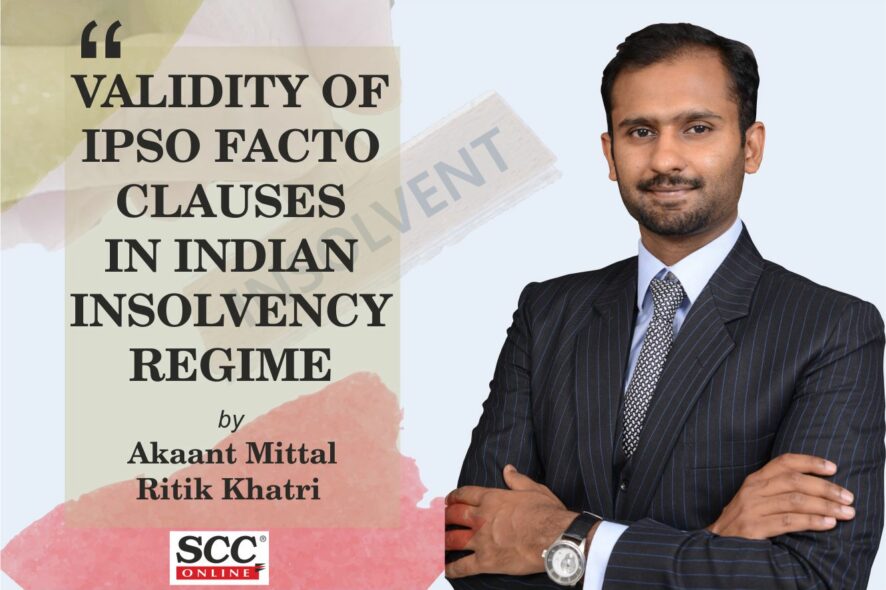The cornerstone of a standard insolvency proceeding is the resolution of a debtor enterprise by keeping it as a going concern, instead of its liquidation. In order to facilitate the same, the insolvency resolution laws seek to ensure that a corporate debtor runs as a going concern even during the time the resolution process takes place. The same entails that the supply of commodities such as electricity, water, raw materials is kept unabated.

However, the same results in a conflict between the “insolvency” proceedings and a particular type of contract, namely, ipso facto contracts. IPSO FACTO clauses are the terms in an agreement that allows a party to terminate the contract in the events of default which generally includes the commencement of voluntary or involuntary insolvency proceedings, the appointment of insolvency representative, amongst others.
These ipso facto clauses hurt the intent of the insolvency proceedings by allowing the terminating party to rescind its obligation under the agreement and thereby vitiating the ‘going concern nature’. On the other hand, secure the non-debtor party from obligating in a commercially unviable contract. This is where the enforceability of ipso facto clauses becomes a contentious issue going to the very root of legal sanctity of an agreement between two consenting parties.
The UNCITRAL Legislative Guide on Insolvency Law acknowledging the debate recommends[1] the desirability of invalidating such clauses in the domestic insolvency regime, and giving importance to the ‘going concern’ nature of the resolution process Similarly, the World Bank’s Principles for Effective Insolvency and Creditor/Debtor Regimes invalidates[2] the ipso facto clauses subjected to certain limitations. The EU Directive also restricts[3] the enforcement of ipso facto clauses when the corporate debtor undergoes restructuring.
Globally, this vexing issue seems to be tilting in favour of invalidation of such clauses in the insolvency cases. Therefore, it becomes pertinent to analyse the cross-border scenario to understand the discrepancy concisely.
In executory contracts where both parties’ obligation is continuously flowing, the US in Section 365(e) of its insolvency law renders ipso facto clauses unenforceable and validates in specific contracts such as swap agreements, securities and forwarding. However, there have been judicial precedents where in non-executory contracts, ipso facto clauses were held unenforceable[4]. Hence, the position remains unsettled.
The UK courts have held that bona fide commercial contracts which contain ipso facto clauses do not[5] violate the anti-deprivation rule. However, a recent amendment to their insolvency law invalidates[6] the ipso facto clauses; it does so only in relation to contracts where the terminating party supplies goods and services to the corporate debtor, not vice-versa.
The Austrian Insolvency Code broadly invalidates[7] ipso facto clauses without prejudice to terminating parties interest getting unreasonably affected. [8]The France commercial code also invalidates such ipso facto clauses. However, Greece insolvency code upholds[9] the validity of ipso facto clauses.
In Australia, the earlier regime validated the ipso facto clauses; however, the new regime prospectively invalidates the enforceability excluding[10] specific contracts such as syndicated loans, securities, bonds, promissory notes, financial products and others. The Singapore insolvency law prohibits[11] the ipso facto clauses prospectively from the cut-off date. However, specific contracts are exempted which include but not limited to derivatives contracts, master netting agreements, covered bond, debentures or connected agreements. Exclusion can also be sought in case of financial hardship caused due to the invalidation of ipso facto clauses.
The objective of the Indian insolvency regime governed by the Insolvency & Bankruptcy Code, 2016 (Code) is resolution through restructuring and value maximisation of the asset of the corporate debtor. The code is silent on the applicability of ipso facto clauses. However, there have been Expert Committee’s suggesting[12] the invalidation of ipso facto clauses to achieve the objective of the code, subject to certain exceptions, keeping in mind the “compelling, commercial, public or social interest in upholding the contractual rights of the counter party to the contract.”
A recent amendment to Section 14 of the code (moratorium) mandated the enforceability to certain grants which include a license, permit, registration, quota, concession, clearances or a similar grant or right given by the government authority to maintain the ‘going concern’ nature of the corporate debtor. The committee’s legislative intent[13] behind the amendment was to ensure the non-termination of such clauses to maintain the commercial value of the corporate debtor by keeping it running as a going concern. The committee noted that the non-bar on such ipso facto clauses will derail the moratorium’s objective during the Corporate Insolvency Resolution Process (CIRP).
Furthermore, Section 14 also permits the supply of essential/critical services to keep corporate debtor a going concern. A recommendation[14] was made to impose a conditional stay on ipso facto clauses during the insolvency resolution process to maintain the freedom of contract and to safeguard the code’s objective. Thus, the position on validity/invalidity of the ipso facto clauses is unsettled in India like in various other jurisdictions.
In a recent case, the Apex institution, the Supreme Court of India, observed[15] the lack of certainty on whether ipso facto clauses are valid or not. The court while observed public interest underlies in each of these balancing considerations but the inherent difficulty when a balance has to be made between positions that are both right in their respective domains. The Court paying deference to the principle of separation of power between the legislature and judiciary recommended that the legislature should provide concrete guidance on the issue.
It is suggested that there needs to be distinction between whether the Corporate Debtor is a supplier or a receiver of such goods and services. In usual circumstances, ipso facto clauses are entered into to protect the suppliers who fear that the event of default may result in non-payment or non-performance of contractual obligation when the receiver of such services undergoes a Resolution Process.
In the other situation where the Corporate Debtor is the receiver of such goods and services, it is suggested that a further distinction may be made between essential goods and services such as electricity, water, IT services and goods such as raw materials. In case of the former supplies, a conditional stay could be imposed on the ipso facto clauses during the CIRP on the condition that Committee of Creditors assents to ongoing payment of the supplier for its services. In case of other goods, balance has to be maintained between autonomy of a contract while not forcing any party to a commercially unviable contract and at the same time ensuring the ‘going concern’ nature to resolve and restructure the bad debts. The same to an extent is already sought to be ensured by including costs of such goods and services to be accounted as Insolvency Resolution Process Costs which carry the top most priority in repayment. In such instance, forcing any party to supply raw materials cannot form a sound principle since in a lot of cases, it has found that the Insolvency Resolution Process Costs is not completely recoverable.
†Akaant Kumar Mittal is an advocate at the Constitutional Courts, and National Company Law Tribunal, Delhi and Chandigarh. He is also a visiting faculty at the NUJS, Kolkata and the author of the commentary Insolvency and Bankruptcy Code – Law and Practice.
††Ritik Khatri is a Law Student at the National Law University, Odisha
[1] The United Nations Commission on International Trade Law (UNCITRAL), Legislative Guide on Insolvency Law, para 118.
[2] The World Bank, Principles for Effective Insolvency and Creditor/Debtor Regimes, Principle C.10.2.
[3] EU Directive, 2019/1023 of 20 June 2019, Recital 40 and Article 7.
[4] Matter of Rose, 21 B.R. 272 (Bankr. D.N.J. 1982).
[5] Belmont Park Investments PTY Limited v BNY Corporate Trustee Services Limited and Lehman Brothers Special Financing Inc, [2011] UKSC 38.
[6]Corporate Insolvency and Governance Act 2020, Section 233B.
[7]Section 25b (2).
[8]Articles L622-1384, L631-14(I)85 and L641-1186.
[9]Article 32.
[10]Corporations Amendment (Stay on Enforcing Certain Rights) Regulations 2018, Schedule 1, Section 5.3A.50.
[11] Insolvency, Restructuring and Dissolution Act 2018, Section 440.
[12] J. J. Irani Report of the Expert Committee on Company Law, May 2005, Para 13.4-13.6.
[13] Report of The Insolvency Law Committee, February 2020, Para 8.4
[14] Vidhi Centre for Legal Policy, The Journey so far and the Road Ahead, Pages 34-35.
[15] Gujarat Urja Vikas Nigam Limited v Mr. Amit Gupta, 2021 SCC OnLine SC 194








[…] This article explores the validity of these clauses. To read more, click here! […]
[…] This article explores the validity of these clauses. To read more, click here! […]